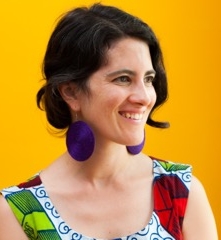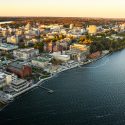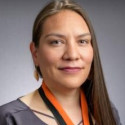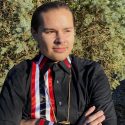Wisconsin Idea Seminar engages UW–Madison faculty and staff with state

Bill Quackenbush, the tribal historic preservation officer for the Ho-Chunk Nation, shares Ho-Chunk stories of life at the water’s edge along Lake Mendota on Picnic Point at the beginning of the Wisconsin Idea Seminar in 2018.
You can live in Wisconsin all your life and think you know it pretty well. But then someone mentions a town or tradition that serves as a reminder — there are still plenty of people to meet and places to go without ever crossing the state line.
For 35 years, the annual road trip known as the Wisconsin Idea Seminar has provided an immersive five-day tour of the state that helps UW–Madison faculty and academic staff engage with Wisconsinites, build relationships, and learn about the educational, industrial, social and political realities of Wisconsin.
This year’s “Bay Tour” is May 11–15 and will include experiences along the shores of Green Bay and Lake Michigan, with stops at the Oneida Nation of Wisconsin, Door County, and other specially chosen sites along the way.
The seminar is designed for UW–Madison faculty and academic staff, with an emphasis on faculty and staff who are new to Wisconsin or new to their role on campus. Individuals may nominate themselves with support from their department chairs or divisional directors. The deadline for nominations is Feb. 15.
“Each year the seminar looks at Wisconsin through a variety of lenses,” says director Catherine Reiland. “Some of the big lenses are agriculture, dairy, Native Nations, and K-12 education. Through those lenses we see different aspects and different parts of Wisconsin. Water also provides a powerful framing to our learning and it runs through many of our seminar experiences.”
Participants become students of Wisconsin life to learn about the state they serve. They return to campus both inspired by a renewed commitment to the Wisconsin Idea and more knowledgeable about the spaces and places from which many of our students originate.
Reiland has been director of the seminar since 2016. She earned her undergraduate degree at UW–Madison and holds a master’s degree from New York University.
“I’ve learned so much about Wisconsin,” says Reiland, whose upbringing in a Guatemalan-American family in Sparta allowed her to see the state “not only as a proud local, but … through the lens of a newcomer.”
“So many people join hands with our Wisconsin Idea Seminar team to tell their stories and to share how they collaborate with local partners to solve problems. They share what they’re proud of and what they’re worried about. I’m reminded time and time again of the deep generosity of the people of Wisconsin for their state and for their university.”
“Many people have never been to a reservation or a tribal community. They’re all different. I hope this gives them a better understanding.
Melissa Metoxen
Some of the highlights of this year’s trip are:
- A Ho-Chunk cultural landscape tour of UW–Madison’s Lakeshore Nature Preserve
- A visit to the Oneida Nation of Wisconsin to learn about food sovereignty programs
- A tour of NEW Water, a water resource utility serving Northeast Wisconsin that cleans 38 million gallons of water a day
- A boat tour of the lower Fox River
- A visit to Brey Cycle Farm outside Sturgeon Bay
- A visit to the Algoma School District
At the Oneida Nation of Wisconsin visit, participants will learn about white corn cultivation, environmental stewardship, healthy soils, and other initiatives that promote health.
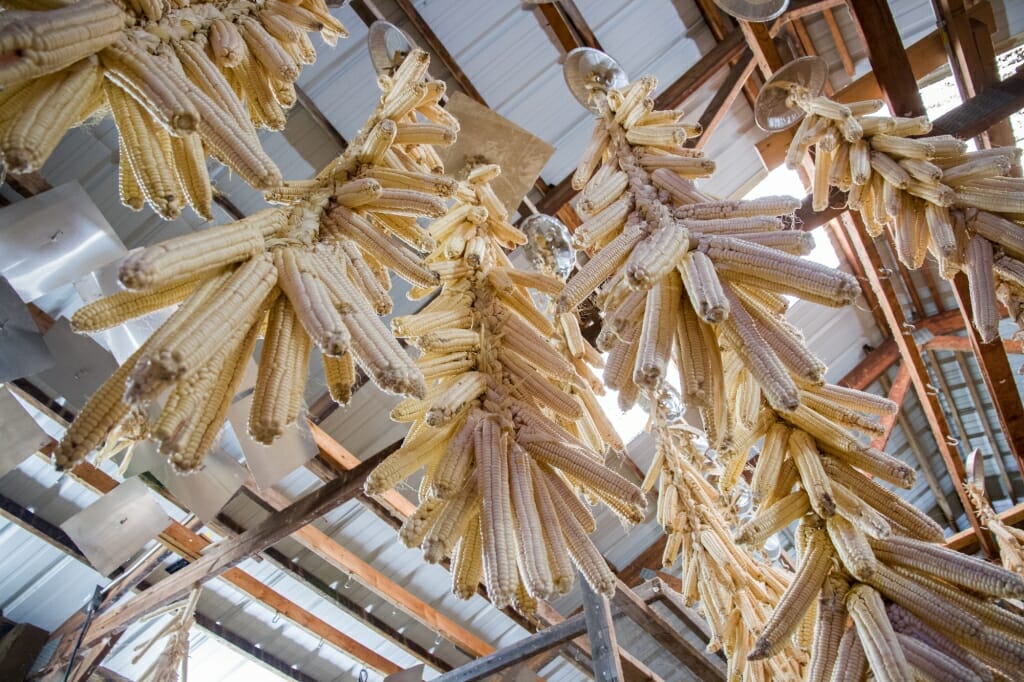
Braided cobs of white corn dry from the rafters of a barn at the Oneida Nation, a destination of the 2020 Wisconsin Idea Seminar. Photo: Catherine Reiland
One of UW–Madison’s collaborations with the Oneida is through the Native American Center for Health Professions (NACHP) in the UW School of Medicine and Public Health. It works with prospective students, current students and health professionals to serve as a central location for opportunities for growth, professional development, mentorship, research and support.
Melissa Metoxen is a member of the Oneida Nation of Wisconsin and serves as the community and academic support coordinator at NACHP’s Tribal Engagement Office in the Oneida Community Health Center. She helped coordinate a visit four years ago by the Wisconsin Idea Seminar and is helping again this year.
“Many people have never been to a reservation or a tribal community. They’re all different,” Metoxen says. “I hope this gives them a better understanding. It’s important to break stereotypes and show diversity among our tribe and all different tribes.”
The stop will include cultural presentations demonstrating dances and a meal of traditional foods.
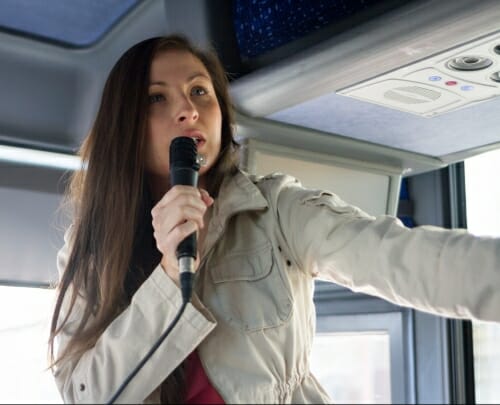
Melissa Metoxen gives a bus talk en route to the Wisconsin Idea Seminar’s visit to the Oneida Nation in 2016. Photo: Catherine Reiland
In her role, Metoxen works with students like Daniel Hayden, a first-year PhD student in plant pathology and NACHP fellow. Hayden graduated with a bachelor of science degree in plant biology from the University of Oklahoma and is a member of the Comanche Nation. He is also Muscogee (Creek), Alabama-Quassarte, and Pawnee.
Hayden is working with the Oneida Nation agricultural co-op, Ohelaku, to understand the relationship between soil biodiversity and diverse crop production approaches for their sacred white corn.
“As a Native American myself, I recognize the importance of these cultural values upheld by traditional knowledge and that we must respect and acknowledge these perspectives,” Hayden says.
The focus of his research is to build upon the traditional knowledge of Indigenous people to understand biological mechanisms and frame sustainable agricultural research from an Indigenous perspective.
“I feel like I’m actually helping Native people — my people,” Hayden says.
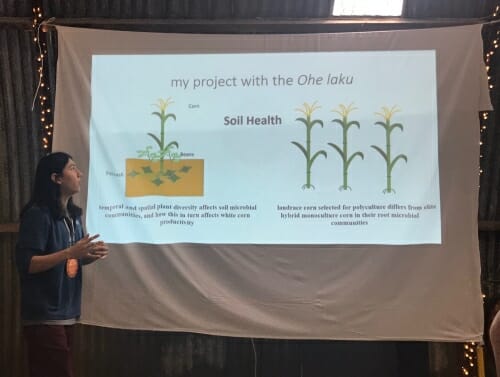
Daniel Hayden is working with the Oneida Nation agricultural co-op, Ohelaku, to understand the relationship between soil biodiversity and diverse crop production approaches for their sacred white corn. Photo courtesy of Daniel Hayden
When the Wisconsin Idea Seminar stops by, Hayden will likely be in the field, something that helps balance out time working in the lab.
“This shows there can be really good, really productive collaborations. There have obviously been a lot of injustices, but this is a step in a good direction,” Hayden says. “This is a way to create strong bonds and show that the Wisconsin Idea means everyone.”
The Wisconsin Idea Seminar is a program of the Office of the Provost and is made possible with the support of many UW–Madison divisions, schools and colleges, and the Evjue Foundation, the charitable arm of The Capital Times and underwriter of the seminar since 1985.
Subscribe to Wisconsin Ideas
Want more stories of the Wisconsin Idea in action? Sign-up for our monthly e-newsletter highlighting how Badgers are taking their education and research beyond the boundaries of the classroom to improve lives.

